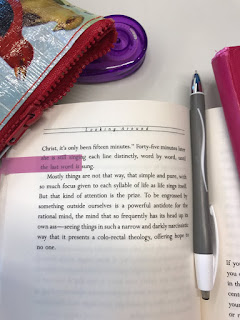I have always written but have never considered myself a 'writer.' Since joining one of the ETA Writing Teachers groups I have begun to engage with what it means to be a writer and it is my hope that the experience of writing regularly and sharing my work with others will give me more insight into what my students experience when they set about the important work of writing.
To further my understanding of the writing process I have engaged with literature exploring pedagogical approaches to the teaching of writing at word, sentence, paragraph, and whole text level but it becomes especially apparent, (especially after my foray into the delight that is the work of Nancie Atwell) that there is something missing. The human element, the grit and determination needed to mould and build pieces of writing. I needed to know more about the compulsion to write and how people overcome blocks and garner inspiration.
 A few months ago I started listening to the Australian Writers' Centre podcast 'So You Want to be a Writer' (featuring authors A.L. Tait and Valerie Khoo). Besides being entertaining, the podcast provides insight into the process of writing fiction, non-fiction, as well as publishing, blogging, and what it means to be a writer in the world. One of the segments that I particularly enjoy is the suggestion of a book about the craft of writing. In Episode 61 Valerie and Allison discuss several texts that they count as influential and worthwhile. I must say, from this initial introduction I have developed a strange love of these non-fiction volumes exploring the writing process and have now filled an entire shelf in my bookcase. The joy!
A few months ago I started listening to the Australian Writers' Centre podcast 'So You Want to be a Writer' (featuring authors A.L. Tait and Valerie Khoo). Besides being entertaining, the podcast provides insight into the process of writing fiction, non-fiction, as well as publishing, blogging, and what it means to be a writer in the world. One of the segments that I particularly enjoy is the suggestion of a book about the craft of writing. In Episode 61 Valerie and Allison discuss several texts that they count as influential and worthwhile. I must say, from this initial introduction I have developed a strange love of these non-fiction volumes exploring the writing process and have now filled an entire shelf in my bookcase. The joy!I started with Anne Lamott's 'Bird by Bird' and I loved it. Here's a few points I pulled from the text:
Ten Snippets of Advice from 'Bird by Bird'

1. Words and writing are what paint and canvas are to a fine artist, a way to interpret and see the world and in Lamott's case, when struggling to find her place as a teenager, to gain some acceptance. The power of story is evident throughout the book.
2. The one-inch picture frame is the precursor to the 'bird by bird' anecdote. Both are suggestions as to how to avoid the all encompassing, desperate, and overwhelming feeling when embarking upon a journey into the unknown. I love how honest Lamott is, an author who has written many novels and books, yet she comes back to first principles - the one inch picture frame, bird by bird.
3. The best possible writing advice? WRITE! Thanks Lamott and also, thanks Goldberg (I will read your work after Stephen King!).
5. The emotional acre we all receive at birth is the perfect pasture to explore what matters to a character - what is happening behind the fence? What is planted there? Who is allowed in? Food for thought and a delicious opportunity to uncover the inner workings of an aloof protagonist. The emotional acre is suitable for writing and life, especially since unwelcome visitors can be told to leave, stat!
6. Character development propels the plot but it needs to be on the page! Write first, smooth later! Lamott's step into dialogue in the following chapter is a joyous one - references to Hemingway and reminders: keep the dialogue 'sharp and lean', ensure each character has a distinct voice, and avoid dialect - good advice!
7. Drafting 'short assignment by short assignment' is a way forward when the going is rough.
8. To be a writer one must be reverent. I love the beautiful stories of friends, family, the world, and her students that Lamott weaves through 'Bird by Bird.' It is a real account of a writerly life - worries, anxieties, panic, self-doubt, alongside the occasional exaltation, however short lived, when a book is published.
9. Live 'big round hours' and write what is most important. Lamott refers to a moral purpose in writing, not in a gratuitous, over-the-top way, but to explore the world to say, 'this is who we are.'
10. Give your best, everyday. There will always be more.
Next: Stephen King's 'On Writing'
Writing about writing is the ultimate in metaconcepts!
ReplyDeleteI can identify with the idea of writing as a compulsion. I think, in a way, my relationship with writing is a struggle against my own mortality - if I can convert my life's experiences into the written word then it might imbue my life with more meaning. Does that make sense? The written word will live on beyond me.